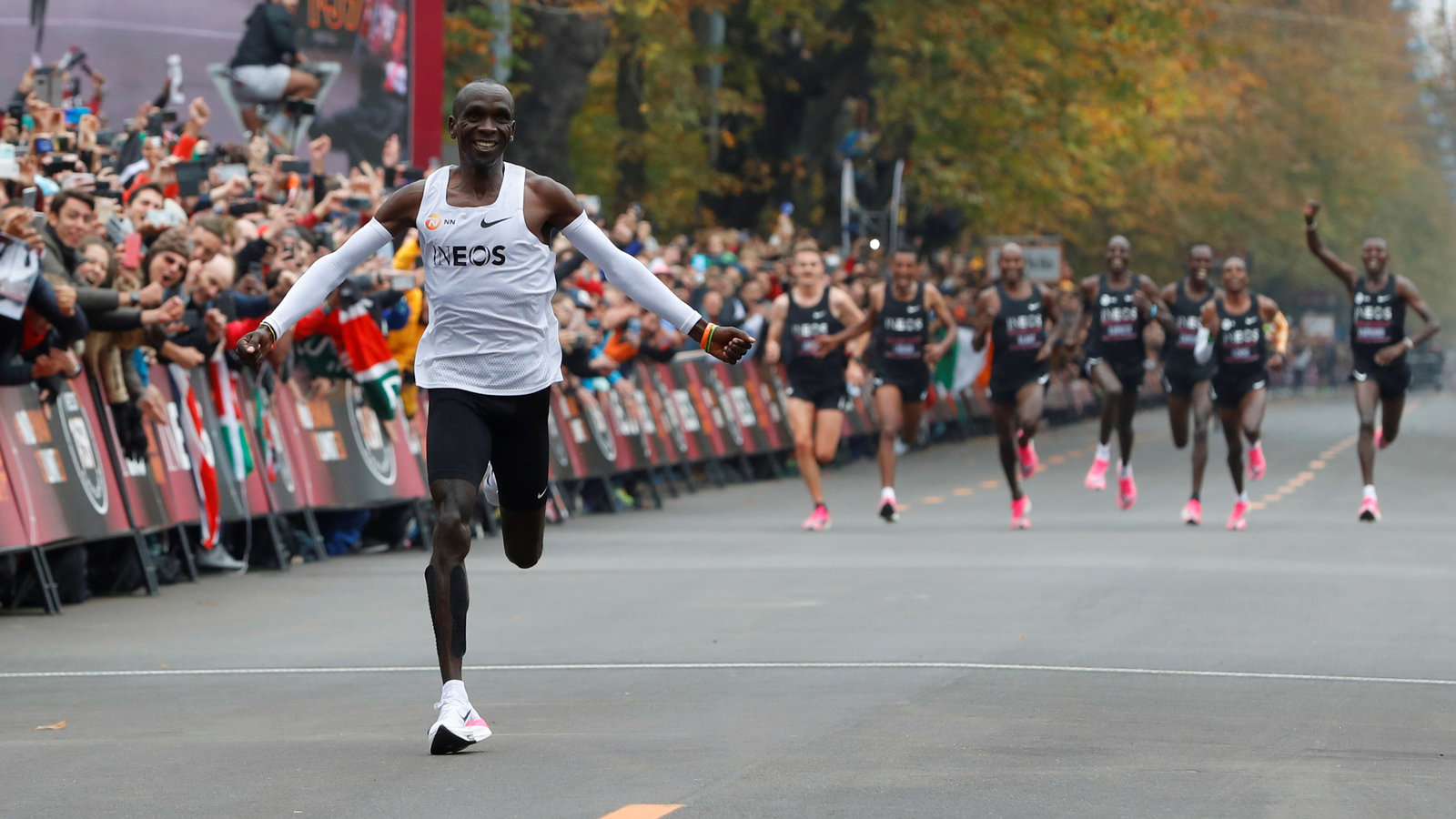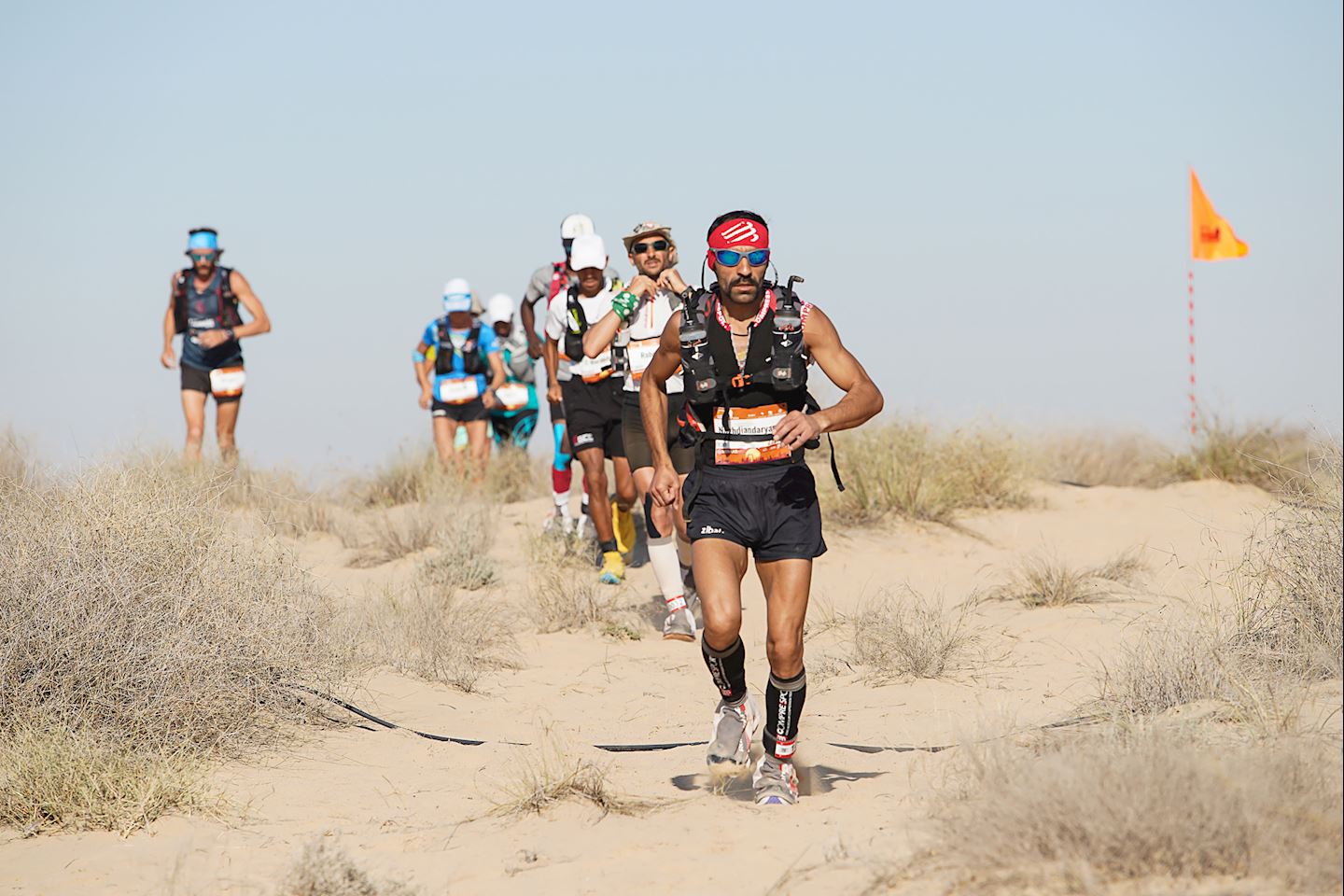

Featured
How To Run An Ultra Marathon
Modified: March 1, 2024
Learn the ins and outs of running an ultra marathon with our featured guide. Discover training tips, nutrition advice, and more to conquer the ultimate endurance challenge.
Introduction
Welcome to the exciting world of ultra marathons! If you’re a passionate runner looking to push your limits and take on a new challenge, you’ve come to the right place. Ultra marathons are races that go beyond the traditional 26.2-mile marathon distance, offering a unique opportunity for runners to test their endurance and mental fortitude.
In this article, we will guide you through the essentials of running an ultra marathon. From choosing the right race to training strategies, nutrition tips, and race day strategies, we’ve got you covered.
Running an ultra marathon is no small feat. It requires careful preparation and a commitment to training, but the rewards are well worth it. Completing an ultra marathon can be a life-changing experience, boosting your confidence, and instilling a sense of accomplishment that extends far beyond the finish line.
Whether you’re new to long-distance running or a seasoned marathoner looking to take your running to the next level, this guide will provide you with the knowledge and insights you need to prepare for and conquer an ultra marathon.
But before we dive into the details, it’s important to acknowledge that running an ultra marathon is not just physical, but also mental. It’s a journey that requires resilience, determination, and a positive mindset. So, get ready to embark on an incredible adventure as we explore the world of ultra marathons.
Choosing the Right Race
When it comes to ultra marathons, the first step is to choose the right race for you. With a wide variety of distances and terrains to choose from, it’s important to consider factors such as your current fitness level, experience, and personal preferences.
Start by researching different ultra marathons in your area or around the world. Look at factors like race distance, elevation gain, trail conditions, and cut-off times. Consider what type of terrain you enjoy running on, whether it’s trails, mountains, or road races.
If you’re a beginner, it’s advisable to start with a shorter distance ultra marathon, such as a 50k or 50-mile race. This will allow you to gradually build up your endurance and get a taste of what the ultra marathon experience is like. As you gain more experience and confidence, you can then progress to longer distances.
Another important factor to consider is the time of year and weather conditions of the race. Some ultra marathons take place in extreme environments, such as deserts or mountains, which require additional training and preparation. Choose a race that aligns with the weather conditions you are comfortable with.
Be sure to read reviews and testimonials from past participants to get a sense of the race organization, course markings, and overall experience. Look for races that have a supportive and inclusive atmosphere, as the ultra running community is known for its camaraderie and encouragement.
Lastly, consider your personal goals and motivations for running an ultra marathon. Are you aiming for a specific time goal, or do you simply want to challenge yourself and have a memorable experience? Reflect on what is most important to you and choose a race that aligns with your aspirations.
Remember, the right race for someone else may not be the right one for you. Take your time to research and find a race that inspires and excites you. This will provide you with the motivation and drive needed throughout your ultra marathon journey.
Setting Goals and Training Plan
Setting clear and realistic goals is essential when preparing for an ultra marathon. Whether it’s completing your first race, improving your time, or conquering a challenging course, having a goal will guide your training and keep you motivated.
Start by assessing your current fitness level and running abilities. Evaluate your strengths and weaknesses to identify areas that need improvement. This will help you tailor your training plan to address specific areas of focus.
When it comes to training for an ultra marathon, it’s important to gradually increase your mileage and build your endurance over time. A structured training plan will help you achieve this without risking injury or burnout.
Consider working with a running coach or following a reputable training program specifically designed for ultra marathons. These plans typically include a mix of long runs, back-to-back runs, tempo runs, and hill workouts to simulate the demands of the race.
Be sure to incorporate cross-training activities into your plan to enhance overall fitness and prevent overuse injuries. Activities such as strength training, yoga, and cycling can help improve muscular strength, flexibility, and recovery.
As you progress through your training, it’s important to listen to your body and adjust your plan as needed. Pay attention to any signs of fatigue or excessive soreness, and don’t be afraid to take rest days or modify workouts when necessary.
In addition to physical training, don’t underestimate the importance of mental preparation. Visualize yourself crossing the finish line and visualize overcoming challenges during the race. Develop strategies to stay motivated when fatigue sets in, such as breaking the race into manageable segments or dedicating each mile to someone or something meaningful.
Remember, training for an ultra marathon is a journey that requires dedication, consistency, and patience. It’s not just about the destination, but the process of self-discovery and personal growth along the way. Embrace the highs and lows of training, and trust in your ability to rise above challenges.
By setting clear goals, following a well-structured training plan, and nurturing your mind and body, you’ll be well-prepared to tackle the demands of an ultra marathon and achieve your desired outcome.
Building Endurance
One of the key components of preparing for an ultra marathon is building your endurance. Since ultra marathons go beyond the standard marathon distance, it’s crucial to train your body to handle the prolonged physical exertion.
Endurance training involves gradually increasing your mileage and time on your feet. Focus on building a strong aerobic base by incorporating long runs into your training plan. Start with shorter distances and gradually increase your mileage each week.
It’s also important to include back-to-back long runs in your training regimen. This means running long distances on consecutive days to simulate the fatigue and mental challenges you’ll face during the race.
Don’t underestimate the power of slow, steady, and consistent running. Many ultra marathoners adopt a run-walk strategy, where they alternate between running and walking during long training runs and races. This can help conserve energy and reduce the risk of burnout.
Incorporate hill training into your workouts to improve strength and endurance. Seek out hilly routes or incorporate hill repeats into your training plan. Uphill running conditions your muscles and cardiovascular system to work harder, which is invaluable in ultra marathons that often feature challenging terrain.
Don’t forget to also prioritize time on your feet. Aim to spend more time running during your long runs, even if this means slowing down your pace. The goal is to get your body accustomed to being on your feet for extended periods of time.
Lastly, consider incorporating other aerobic activities into your training, such as swimming or cycling, to give your body a break from high-impact running while still building endurance.
Remember that building endurance takes time, and it’s important to listen to your body and avoid overtraining. Gradually increase your mileage and training intensity, allowing for proper recovery and adaptation.
By focusing on building your endurance through long runs, back-to-back runs, hill training, and low-impact aerobic activities, you’ll be well-prepared to conquer the distances and challenges that come with an ultra marathon.
Strength and Cross-Training
In addition to building endurance, incorporating strength training and cross-training into your ultra marathon training plan is crucial. These activities help improve overall fitness, prevent injuries, and enhance performance.
Strength training plays a vital role in developing strong muscles and improving running efficiency. Focus on exercises that target the muscles used in running, such as the quadriceps, hamstrings, glutes, and core. Incorporate exercises like squats, lunges, deadlifts, planks, and stability ball exercises into your routine.
Aim to include strength training sessions 2-3 times per week. Start with lighter weights and higher repetitions, gradually increasing the resistance as your body adapts. Consult with a strength coach or personal trainer to ensure proper form and technique.
Cross-training activities, such as swimming, cycling, or using an elliptical machine, provide the opportunity to give your running muscles a break while still maintaining cardiovascular fitness. These low-impact activities can help improve endurance, build aerobic capacity, and provide variety to your training regimen.
Yoga and Pilates are also excellent cross-training options as they improve flexibility, balance, and core strength. These practices can help you maintain good posture, prevent injuries, and enhance overall body awareness.
Don’t forget to include mobility and flexibility exercises in your routine. Dynamic warm-up exercises, such as leg swings and arm circles, help prepare your muscles and joints for running. Cool down with static stretches to increase flexibility and prevent muscle tightness.
Remember, while strength and cross-training are important elements of your training plan, they should complement your running workouts, not replace them. Prioritize running and gradually increase your mileage as your body allows, while incorporating strength and cross-training activities to enhance your overall fitness.
Be mindful of recovery and listen to your body. Give yourself adequate rest days to allow for muscle repair and avoid overtraining. Recovery techniques such as foam rolling, massage, and sufficient sleep are also vital in maintaining optimal performance and minimizing the risk of injury.
By incorporating strength training, cross-training, and mobility exercises into your training plan, you’ll build overall body strength, improve balance and flexibility, and reduce the likelihood of injuries, ultimately enhancing your performance in the ultra marathon.
Nutrition and Hydration
Proper nutrition and hydration play a critical role in the success of your ultra marathon journey. Fueling your body with the right nutrients and staying properly hydrated will optimize your performance and help you maintain energy throughout the race.
Start by focusing on a well-balanced diet that includes a variety of whole foods. Incorporate carbohydrates, proteins, and healthy fats into your meals to provide the energy and nutrients your body needs. Opt for complex carbohydrates like whole grains, fruits, and vegetables, which provide sustained energy.
During your training runs, practice fueling strategies to find what works best for you. Experiment with different types of energy gels, chews, bars, and drinks. Aim to consume carbohydrates during long runs to replenish glycogen stores and prevent fatigue. Remember to practice your nutrition plan during your longest training runs to ensure it works well for you.
Hydration is key in endurance events like ultra marathons. Aim to consume fluids regularly, even before you feel thirsty. Water is important, but you’ll also need to replenish electrolytes lost through sweat. Consider using an electrolyte drink or adding electrolyte tablets to your water to maintain proper electrolyte balance.
During longer training runs, mimic race conditions by carrying a hydration pack or using aid stations to practice hydrating on the go. This will help you become familiar with the sensations of drinking and eating while running.
It’s important to listen to your body’s signals during the race. Pay attention to hunger and thirst cues, and make sure to refuel and rehydrate accordingly. Don’t wait until you’re feeling depleted to eat or drink. Regularly consume small amounts of food and fluids to maintain your energy levels.
Remember that everyone’s nutritional needs are different, so it’s essential to find what works best for you through trial and error during your training runs. Consider consulting with a sports nutritionist to develop a personalized nutrition plan based on your specific requirements.
Lastly, don’t forget about post-race nutrition and recovery. Consume a mix of carbohydrates and proteins within 30 minutes of finishing the race to kickstart the recovery process. Eat a well-rounded meal within a few hours to replenish glycogen stores and support muscle repair.
By prioritizing proper nutrition and hydration, you’ll provide your body with the fuel and hydration it needs to perform at its best during an ultra marathon. Practice your nutrition and hydration strategies during training, and fine-tune them until you find the optimal approach for race day.
Rest and Recovery
Rest and recovery are often overlooked but essential components of ultra marathon training. It’s during this time that your body repairs and rebuilds, allowing for adaptation and improvement. Incorporating proper rest and recovery strategies into your training plan will help prevent injuries and optimize performance.
One of the most important aspects of recovery is getting enough sleep. Aim for 7-9 hours of quality sleep each night to allow your body to repair and rejuvenate itself. Sleep is when your muscles grow stronger, and your energy stores are replenished.
In addition to sleep, active recovery plays a significant role in the rehabilitation process. Engage in low-intensity activities such as gentle stretching, yoga, or walking to promote blood flow and aid in muscle recovery. Active recovery can help reduce muscle soreness and stiffness by flushing out metabolic waste products.
Incorporate rest days into your training schedule to allow your body to recover and adapt to the demands of your training. Rest days should be complete rest from all physical activity, allowing your muscles, tendons, and ligaments to recover and rebuild.
Cross-training activities, such as swimming or cycling, can also serve as active recovery and give your running muscles a break while still maintaining cardiovascular fitness.
Recovery nutrition is also crucial in allowing your body to recover effectively. After a long run or intense workout, consume a combination of carbohydrates and proteins to replenish glycogen stores and support muscle repair.
Don’t forget about the importance of self-care during your ultra marathon training. Incorporate practices such as foam rolling, massage, and stretching into your routine to relieve muscle tension and promote flexibility. These activities can help prevent injuries and expedite recovery.
Lastly, listen to your body and be aware of any signs of overtraining or fatigue. Pushing through excessive fatigue or pain can lead to prolonged injuries and setbacks. If you need to take extra rest days or modify your training plan, do so without hesitation. Your body knows best, and giving it the time it needs to recover will ultimately benefit you in the long run.
Remember, rest and recovery are not signs of weakness but essential strategies for optimizing performance and preventing burnout. By prioritizing rest, sleep, active recovery, and self-care, you’ll ensure your body is adequately prepared for the demands of an ultra marathon.
Injury Prevention and Treatment
Injury prevention should be a top priority for any ultra marathon runner. The repetitive strain and impact on your body during long-distance running increase the risk of overuse injuries. By implementing proper prevention strategies and addressing any issues promptly, you can minimize the likelihood of injuries derailing your training and race day.
One of the most effective ways to prevent injuries is to gradually increase your mileage and intensity during training. Avoid sudden spikes in mileage or drastic changes in terrain that your body isn’t accustomed to. Gradual progression allows your muscles, tendons, and ligaments to adapt and become stronger.
Include strength and flexibility exercises in your training plan to build overall body strength and mobility. Focus on exercises that target weak areas or areas prone to injury, such as the hips, glutes, core, and ankles. Consistent strength training can help improve running form and prevent muscular imbalances.
Listen to your body and respond to any warning signs of injury. If you experience persistent pain or discomfort, it’s crucial to address it early. Rest, ice, compression, and elevation (RICE) can be helpful in the initial stages of injury treatment.
Consider seeking professional help from a sports medicine specialist, physical therapist, or chiropractor if you experience persistent pain or if you want guidance on injury prevention. They can provide specialized assessments and recommendations to help you recover and prevent future injuries.
Additionally, maintaining proper running form is essential in preventing injuries. Focus on your posture, stride length, and foot strike to ensure optimal biomechanics. If you’re unsure about your running form, consider consulting with a running coach or participating in a gait analysis session.
Don’t neglect rest and recovery as they are crucial in preventing overuse injuries. Allow sufficient time for rest days, active recovery, and sleep to give your body the opportunity to repair and rejuvenate itself. Overtraining and insufficient recovery can lead to fatigue and increased risk of injuries.
Lastly, remember the importance of proper nutrition and hydration in supporting your body’s ability to recover and prevent injuries. Fueling your body with the right nutrients and maintaining adequate hydration levels will promote tissue repair and optimize your performance.
By implementing these injury prevention strategies, listening to your body, and addressing any issues promptly, you’ll minimize the likelihood of injuries interfering with your training and race day. Prioritize injury prevention to ensure a successful and enjoyable ultra marathon experience.
Gear and Equipment
Choosing the right gear and equipment is essential for a comfortable and successful ultra marathon. The right gear can enhance your performance, protect you from the elements, and prevent discomfort and injuries.
Start with your running shoes, as they are arguably the most important piece of gear for any runner. Invest in a good pair of trail running shoes that offer proper support and traction for the terrain you’ll be running on. Make sure they fit well and have been adequately broken-in before race day.
Appropriate clothing is also crucial. Opt for moisture-wicking and breathable fabrics that help regulate body temperature and prevent chafing. Consider wearing layers that can be easily adjusted as the weather changes during the race. Carry extra layers for colder conditions or rain and pack them in a lightweight and compressible jacket.
Pay attention to your socks as well. Choose moisture-wicking socks that provide cushioning and help prevent blisters. Experiment with different brands and styles during your training to find the ones that work best for you.
A hydration system is essential for ultra marathons. Whether it’s a hydration pack, handheld water bottle, or a combination of both, choose what works best for your comfort and hydration needs. Practice using your chosen hydration system during training to ensure it’s comfortable and easy to access while on the move.
Carrying a lightweight backpack or waist belt can be helpful to store essentials such as nutrition, extra clothing, a first-aid kit, and other small items you may need during the race.
Consider using trekking poles if you’re running on hilly or technical terrain, as they can provide stability and reduce impact on your joints.
Other essential gear includes a hat or visor to protect you from the sun, sunglasses to shield your eyes, and sunscreen to protect your skin from harmful UV rays. Don’t forget to bring a headlamp or flashlight if you’ll be running in low-light conditions or during the night.
It’s crucial to test and familiarize yourself with all your gear and equipment during training runs. This will allow you to make any necessary adjustments and avoid any surprises or discomfort on race day.
Lastly, don’t forget about recovery tools such as foam rollers or massage balls to help alleviate muscle soreness and aid in recovery after long training runs and the race itself.
By investing in the right gear and equipment, you’ll set yourself up for a more enjoyable and successful ultra marathon experience. Choose gear that is comfortable, functional, and appropriate for the race conditions, and don’t forget to test and adjust your gear during training to ensure it works well for you.
Mental Preparation
Mental preparation is just as important as physical training when it comes to tackling an ultra marathon. Ultra marathons test not only your physical endurance but also your mental resilience and determination. Developing a strong mindset will help you overcome challenges, stay focused, and reach your goals.
Visualize success and positive outcomes during your training. Imagine yourself crossing the finish line, feeling strong and accomplished. Visualize overcoming obstacles during the race, such as fatigue or self-doubt. Use this mental imagery to boost your confidence and motivation.
Break down the race into smaller, manageable segments. Rather than focusing on the entire distance, focus on reaching each aid station or checkpoint. Set mini-goals throughout the race to keep yourself engaged and motivated.
Develop strategies to handle low points during the race. It’s normal to experience moments of doubt or fatigue. Prepare mental mantras or phrases to repeat to yourself when the going gets tough. Remind yourself of your training, your commitment, and your reasons for taking on this challenge.
Practice mindfulness and stay present during the race. Pay attention to your breathing, your surroundings, and the sensations in your body. Avoid getting caught up in negative thoughts or worrying about what’s ahead. Stay focused on the present moment and the immediate task at hand.
Tap into the power of your support system. Surround yourself with positive and encouraging people who believe in you and your abilities. Draw support from friends, family, or fellow runners who have been through similar experiences. Share your journey with them and lean on their support when needed.
Stay adaptable and be ready for unexpected situations. Ultra marathons are full of variables, from weather changes to course conditions. Embrace the uncertainty and be willing to adjust your strategy or goals as needed. This flexibility will help you make the most of any situation that arises.
Don’t forget to enjoy the experience! While ultra marathons are physically demanding, they are also incredibly rewarding. Take in the beautiful scenery, embrace the camaraderie of fellow runners, and celebrate every milestone along the way. Find joy in the journey and be proud of yourself for taking on this bold and challenging endeavor.
By focusing on mental preparation and developing a resilient mindset, you’ll be better equipped to handle the physical demands and unforeseen challenges of an ultra marathon. Embrace the mental aspect of the race, believe in yourself, and remember that your mind is a powerful tool that can drive you to achieve greatness.
Race Day Strategies
Race day is the culmination of all your hard work and preparation. Having a well-thought-out race day strategy will help you navigate the physical and mental challenges that come with an ultra marathon. Here are some key strategies to consider:
Start with a solid warm-up routine. Engage in light jogging, dynamic stretching, and mobility exercises to prepare your muscles and joints for the demands of the race. This will help prevent injuries and allow you to start the race feeling primed and ready.
Manage your pacing wisely. It’s easy to get caught up in the excitement of the race and start too fast. Remember that an ultra marathon is a long-distance event, so start conservatively and find a comfortable pace that you can sustain throughout the race. Save energy for the later stages when fatigue sets in.
Stick to your nutrition and hydration plan. During the race, regularly consume carbohydrates, fluids, and electrolytes to replenish your energy stores and maintain hydration. Practice your race day nutrition strategy during your long training runs to ensure it works well for you.
Break the race into manageable segments. Mentally divide the course into smaller sections or aid stations. Focus on reaching each checkpoint rather than getting overwhelmed by the entire distance. Celebrate each milestone as a small victory.
Take advantage of aid stations. Use aid stations strategically by refilling your water bottles, consuming fuel, and taking a moment to regroup. Take a mental break, interact with volunteers and fellow runners, and utilize the support available.
Stay mentally engaged. Keep your mind focused and distracted from fatigue or negative thoughts by listening to music, podcasts, or audiobooks. Engage in positive self-talk, repeating affirmations or mantras to keep yourself motivated and determined.
Adapt to the conditions. Be prepared for changes in weather and course conditions. Dress appropriately and adjust your strategy based on the circumstances. Stay flexible and make decisions that align with your safety and overall race performance.
Embrace discomfort and embrace the highs and lows. Ultra marathons are challenging both physically and mentally. Expect difficult moments and remember that they are part of the journey. Stay resilient and draw strength from the knowledge that you can overcome obstacles and push through tough times.
Utilize spectators and fellow runners for support. The atmosphere of an ultra marathon is often filled with camaraderie and encouragement. Draw energy from the cheers of spectators and the shared experience with other runners. Interact with fellow runners, offer support, and find inspiration from their stories.
Lastly, enjoy the experience and soak in the moment. Ultra marathons are unique and memorable events. Take time to appreciate the beautiful scenery, the accomplishment of reaching milestones, and the incredible feeling of crossing the finish line.
By implementing these race day strategies, you’ll be equipped to navigate the physical and mental challenges of an ultra marathon. Stay focused, stay positive, and believe in your training. Race day is your opportunity to put all your hard work into action and achieve your goals.
Conclusion
Congratulations! You’ve reached the end of our comprehensive guide to running an ultra marathon. By now, you should feel equipped with the knowledge and strategies necessary to embark on this incredible journey.
Running an ultra marathon is a test of physical endurance and mental resilience. It requires dedication, consistent training, and a strong mindset. But the rewards are immeasurable. Completing an ultra marathon is an amazing accomplishment, pushing your boundaries and showing you what you’re truly capable of.
Remember to choose the right race for your abilities and preferences. Set clear goals and create a well-structured training plan that gradually builds your endurance and includes strength and cross-training. Focus on proper nutrition, hydration, rest, and recovery, as they are crucial for optimal performance and injury prevention.
Don’t underestimate the power of mental preparation. Develop mental strategies to keep you focused, motivated, and resilient during your training and on race day. Embrace the highs and lows of the journey, adapt to challenges, and rely on your support system for encouragement.
On race day, implement pacing strategies, stick to your nutrition plan, and stay mentally engaged. Break the race into manageable segments, adapt to changing conditions, and take advantage of aid stations and the support of fellow runners.
Throughout the process, remember to enjoy the experience. Take in the beautiful scenery, celebrate milestones, and embrace the sense of achievement that comes with completing an ultra marathon.
Now, prepare yourself mentally and physically, lace up your shoes, and take that first step towards the incredible world of ultra marathons. Good luck on your journey, and may your ultra marathon be an unforgettable adventure of self-discovery, resilience, and triumph!









